Introduction
Artificial Intelligence (AI) is not just a buzzword; it’s a game-changer in the consulting landscape, reshaping how organizations operate and deliver value. By harnessing advanced technologies, businesses can enhance decision-making, streamline processes, and unlock actionable insights that drive significant improvements. From implementing robotic process automation to leveraging predictive analytics, AI is empowering consultants to tackle complex challenges and foster innovation.
However, as firms strive to integrate these transformative solutions, they must navigate hurdles such as employee resistance and data quality issues. This article delves into the multifaceted impact of AI on consulting practices, exploring successful case studies and offering strategic insights to help organizations embrace the future of AI in their operations. With the right approach, firms can not only survive but thrive in an increasingly competitive landscape.
Defining AI in the Consulting Landscape
Artificial Intelligence (AI) is transforming the advisory landscape by integrating advanced technologies and methodologies that significantly improve decision-making, optimize processes, and produce actionable insights that provide substantial business value. AI consulting services include a diverse range of offerings, such as:
- Implementing robotic process automation (RPA)
- Conducting thorough analysis
- Developing customized AI solutions that align with specific organizational objectives
For example, a recent case study illustrated how a mid-sized healthcare company faced challenges with:
- Manual information entry errors
- Slow software testing
- Difficulties integrating outdated systems
By automating data entry, software testing, and legacy system integration using GUI automation, the company achieved a 70% reduction in errors and a 50% acceleration in testing processes. Such measurable outcomes highlight the effectiveness of RPA in enhancing productivity and operational performance.
This strategic approach enables companies to:
- Streamline operations
- Reduce costs
- Boost overall efficiency by automating repetitive tasks and leveraging data-driven insights
As businesses face increasing pressures to innovate and maintain competitiveness, understanding the crucial role of AI in advisory services is essential for skillfully navigating the complexities of modern operations and utilizing the potential of these transformative technologies.
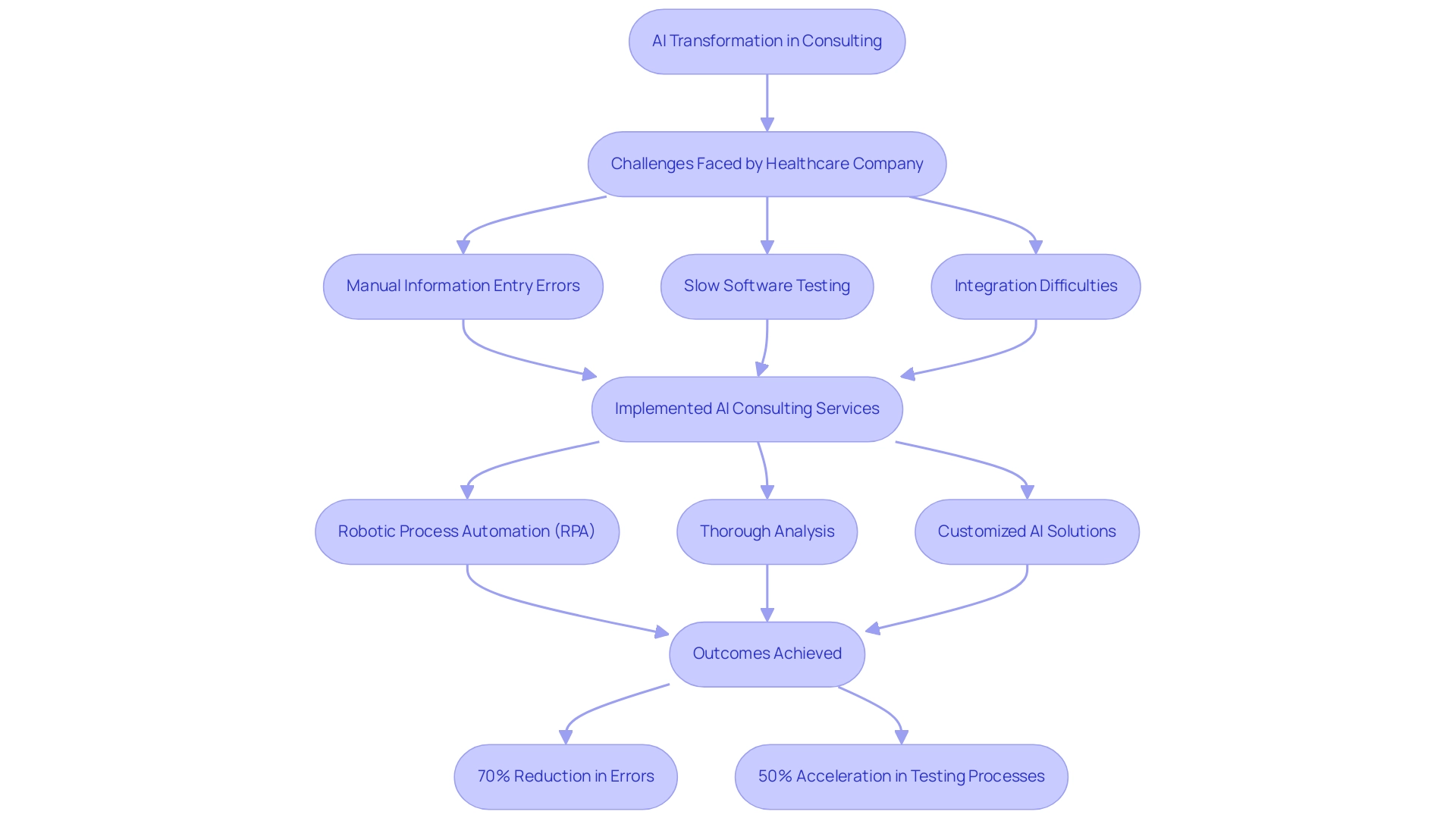
The Transformative Impact of AI on Consulting Practices
The impact of AI on consulting practices is nothing short of revolutionary, ushering in a shift from conventional methodologies to forward-thinking, technology-driven strategies. Recent advancements in AI tools, such as enhanced natural language processing and machine learning algorithms, empower consultants to analyze extensive datasets at remarkable speeds, providing actionable insights that were once beyond reach.
Our Robotic Process Automation (RPA) solutions, including EMMA RPA and Microsoft Power Automate, specifically address task repetition fatigue and staffing shortages by streamlining repetitive tasks like data entry and report generation. This significantly enhances operational productivity and employee morale, allowing consultants to focus on strategic, high-value activities and fostering creativity in problem-solving.
Furthermore, AI personalizes client interactions through predictive analytics and enhanced communication channels, ensuring that the human element remains integral to the advisory process. As a result, advisory firms that effectively harness these AI technologies are elevating their operational efficiency and delivering exceptional value to clients, leading to increased satisfaction and fostering long-term, mutually beneficial partnerships.
Embracing transformative tools and strategies, such as tailored AI solutions and GenAI Workshops, positions firms to navigate the overwhelming AI landscape and thrive in the evolving advisory environment of 2024 and beyond.
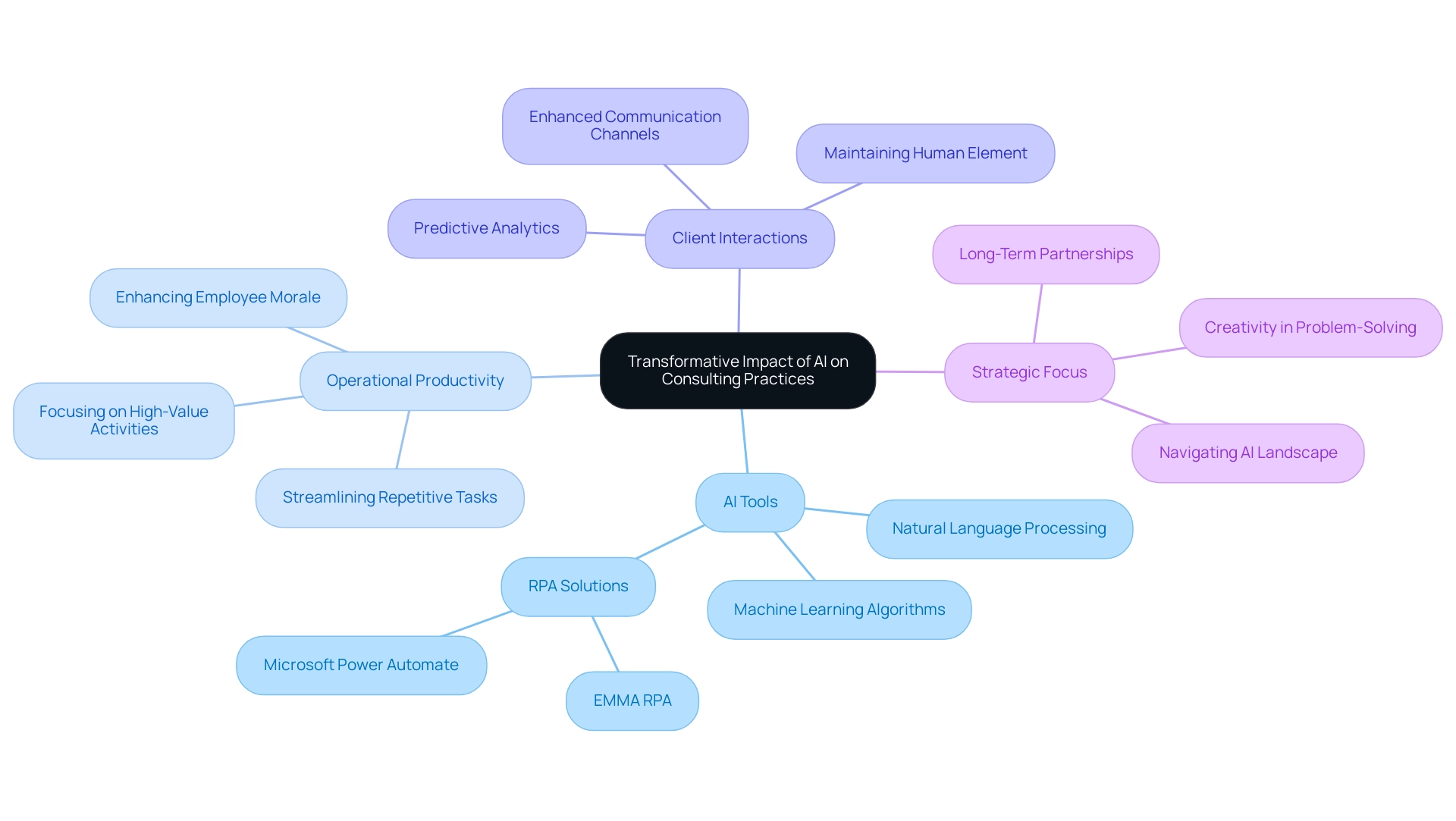
Challenges in Implementing AI Solutions in Consulting
Implementing AI solutions in consulting can be a complex journey, fraught with challenges that organizations must navigate with care. A significant hurdle is often the resistance to change from employees, which stems from fears of job displacement and a general apprehension toward new technologies. Recent statistics reveal that only 16% of respondents feel their organizations fully understand the costs associated with developing AI-based products and services, indicating a concerning knowledge gap that can intensify resistance. Furthermore, integration issues with existing systems complicate this landscape, as consultants face difficulties aligning new AI capabilities with established workflows.
Matthew Evans, Vice President of Digital Transformation at Airbus, emphasizes a crucial mindset: “We don’t invest in AI. We invest in solving business problems.” This perspective highlights the necessity of framing AI initiatives around tangible business challenges rather than the technology itself, ensuring that every implementation drives value.
Moreover, addressing poor master information quality is critical; inconsistent and inaccurate information can lead to misguided insights and flawed decision-making. Robotic Process Automation (RPA) can play a vital role here by automating data entry and validation processes, thereby improving data accuracy and consistency. Organizations like Infosys set a proactive example by training employees to adapt to AI-driven changes in service offerings, fostering a collaborative culture that significantly reduces resistance to AI adoption.
By tackling these challenges directly—through comprehensive training, highlighting long-term benefits, and cultivating an innovation-friendly environment—consulting firms can successfully navigate the complexities of AI implementation and unlock its vast potential. It is imperative for companies to act decisively in preparing for AI’s impacts. Inertia is not an option; executives must develop a foundational understanding of AI to leverage analytics effectively, which is crucial for overcoming employee resistance and achieving successful implementation. Customized AI solutions, along with RPA, can offer the essential assistance to improve operational performance and meet specific business requirements.
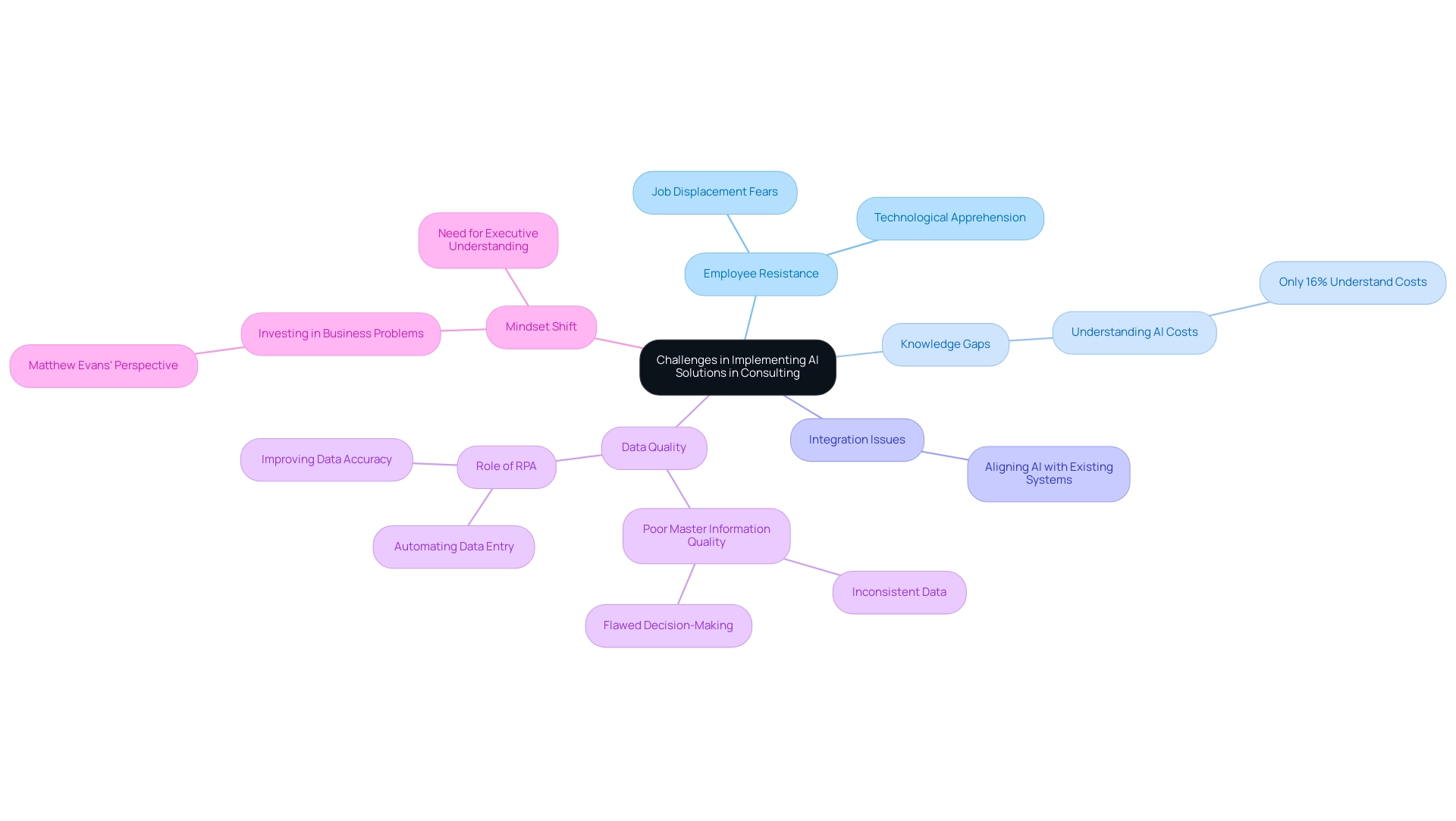
The Future of AI in Consulting
The future of AI in advisory services is poised for unprecedented growth and innovation. With the rise of Robotic Process Automation (RPA), businesses can automate manual workflows, significantly boosting operational efficiency and employee morale. Tools such as EMMA RPA and Microsoft’s Power Automate are at the forefront of this transformation, enabling organizations to streamline their processes effectively.
According to EY’s analysis, jurisdictions such as Canada and the EU are implementing varied regulatory approaches that shape the landscape for AI applications in advisory services. As the technological landscape evolves, companies can expect a surge of sophisticated AI applications designed to enhance decision-making processes. A notable trend is the burgeoning field of AI-driven predictive analytics, empowering consultants to deliver precise forecasts and strategic recommendations that drive business growth.
For instance, a case study from EY highlights how an advisory firm utilized predictive analytics to optimize supply chain management, leading to a remarkable 20% reduction in operational costs. Furthermore, the integration of Business Intelligence with RPA allows organizations to transform raw data into actionable insights, enabling informed decision-making.
However, as businesses navigate the overwhelming array of AI options, tailored solutions become essential for identifying the right technologies that align with specific goals. As AI becomes increasingly integral to advisory practices, firms that commit to continuous learning and adaptability will be uniquely positioned to excel in this evolving landscape.
At EY, we are dedicated to building a better working world, recognizing that our insights and services create long-term value for clients, people, and society, while fostering trust in capital markets amidst these transformative changes in AI regulation and strategy.
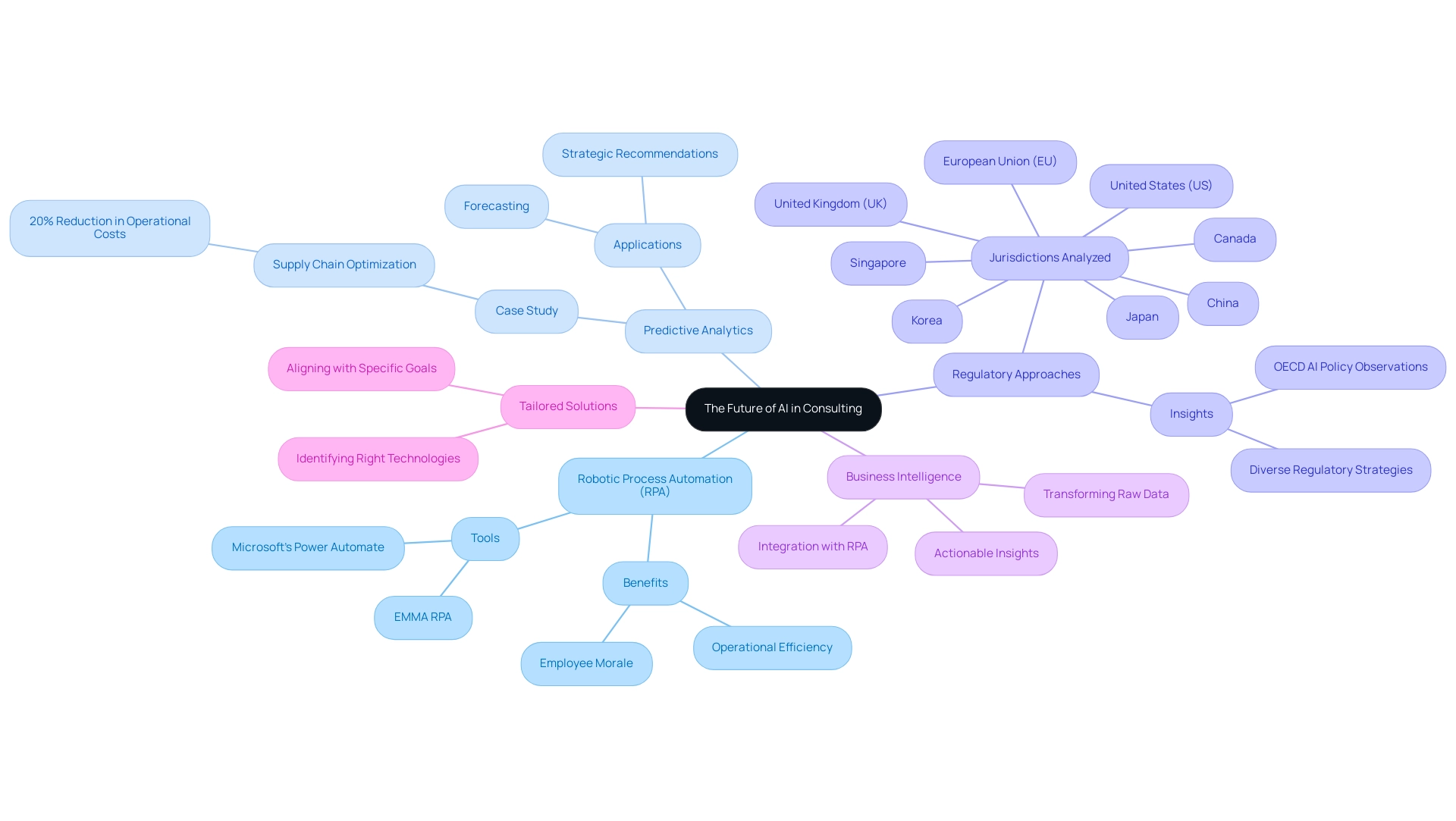
Case Studies: Successful AI Implementations in Consulting
Organizations across different sectors have effectively utilized the capabilities of AI solutions to transform their consulting practices, resulting in substantial enhancements in productivity and client satisfaction. For instance, a mid-sized company faced challenges such as:
- Manual information entry errors
- Slow software testing
- Difficulty integrating outdated systems without APIs
By automating information entry, software testing, and legacy system integration through GUI automation, the company achieved a remarkable 70% reduction in entry errors and an 80% enhancement in workflow efficiency. Similarly, a prominent management advisory firm implemented AI-driven analytics to refine its client onboarding process, achieving a 30% reduction in onboarding time while boosting client satisfaction scores.
In another notable instance, a financial advisory firm adopted Robotic Process Automation (RPA) to streamline data collection and reporting, minimizing errors and allowing consultants to focus on high-value strategic advisory services. As Ross Kurhanskyi, VP of Business Development, emphasizes, “Contact MagicFuse for a strategic AI implementation plan to integrate Salesforce Einstein AI effectively.”
These compelling case studies demonstrate the transformative potential of AI in consulting, showcasing its ability to enhance operational efficiency and deliver superior outcomes for clients. By studying these successful implementations, other firms can gain valuable insights into effectively integrating AI into their operations, paving the way for improved performance and client engagement.
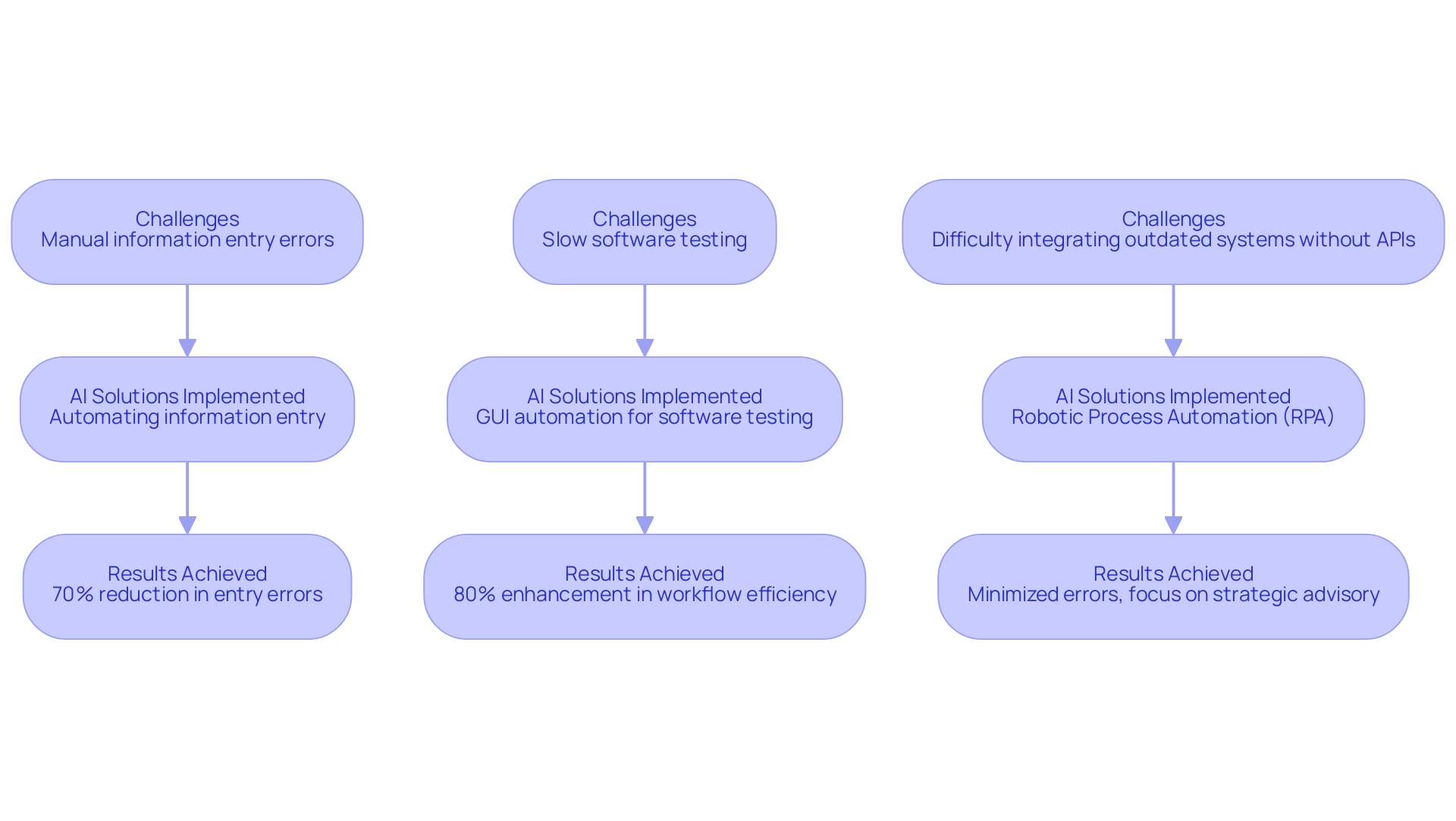
Conclusion
The integration of Artificial Intelligence in consulting is not merely an enhancement; it is a fundamental shift that redefines how organizations operate. By embracing AI technologies such as robotic process automation and predictive analytics, consulting firms can streamline operations, reduce costs, and unlock new levels of efficiency. The case studies presented illustrate that businesses can achieve significant improvements—like a 70% reduction in data entry errors and a 30% decrease in onboarding time—by implementing tailored AI solutions.
However, the path to successfully integrating AI is not without its challenges. Resistance from employees and data quality issues can hinder progress. It is crucial for organizations to address these hurdles head-on by fostering a culture of collaboration, providing comprehensive training, and emphasizing the tangible business problems that AI can solve.
By doing so, firms can mitigate fears associated with technological change and promote a more innovative environment.
Looking ahead, the future of AI in consulting is bright, with continuous advancements poised to drive further innovation. Organizations that commit to adapting and learning will not only navigate the complexities of AI but will also thrive within the evolving landscape. As consultants leverage AI to enhance decision-making and deliver exceptional value, the potential for improved client satisfaction and operational success becomes limitless.
The time to act is now; embracing AI is essential for firms aiming to stay competitive and achieve long-term success in the consulting arena.

